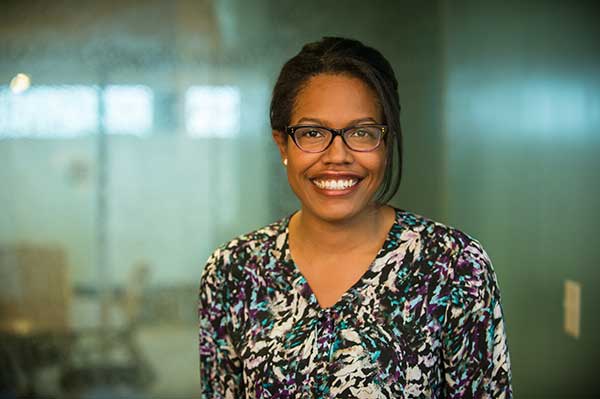Khoury News
Keeping Track of Wellness: Alumna and Professor Andrea Grimes Parker
It’s well established that activity tracking systems such as a Fitbit or Garmin are great at monitoring activity levels, counting and graphing daily minutes. What if your child could use […]

It’s well established that activity tracking systems such as a Fitbit or Garmin are great at monitoring activity levels, counting and graphing daily minutes. What if your child could use a tracking app that creatively motivated them to be active – for example, to provide rocket fuel for their virtual spaceship?
Through the development of technology such as the digital game Spaceship Launch, Assistant Professor Andrea Grimes Parker (BSCS, ‘05) designs interactive systems that inspire family-based behavior change. Jointly appointed in Northeastern’s Khoury College of Computer Sciences and Bouvé College of Health Sciences, Parker’s research centers on creating and evaluating how technology can achieve health equity, with a focus on racial, ethnic and economic health disparities. Describing her work, Parker explains that she is “not designing technology for the sake of technology, but to deeply understand how interactive systems can impact human behavior and values – the things that make us human and constitute our lives.”
Originally from California, Parker credits Professor Bryant York for getting her involved in research during her freshman year at Northeastern. Professors Robert Futrelle and Peter Tarasewich taught Grimes Parker to “ask good questions and focus on gaps in knowledge that need to be filled.” Later, as a PhD student in human-centered computing at Georgia Institute of Technology, Parker decided on a career in academia so she could have the flexibility to choose the research problems she was most interested in.
Now with dual faculty appointments at Northeastern, Parker says she has found “the ideal opportunity to be a part of a program that unifies computer science and personal health in a way not found at many other universities.” In 2018, she received a best paper honorable mention award at the ACM CHI Conference on Human Factors in Computing Systems. She is currently involved in seven research projects, including three NSF grants, two internal grants from Northeastern, as well as spin-off projects from those grants.
Identifying wellness as the unifying theme of her many research activities, Parker describes it as more than simply the absence of illness, but rather “a state of physical, mental, emotional and spiritual well-being and the ability to achieve one’s goals in life.” Her research often focuses on low socioeconomic status (SES) families, who often face increased barriers to overall wellness. In her research on activity tracking systems, for example, Parker discovered there were limited studies conducted to determine if or how tracking tools are helpful for low-income families in particular.
In April of this year, Parker and her research team will launch StoryWell, a digital game designed around enjoyable stories to help families set and meet their physical activity goals in order to gain access to still more stories. Herman Saksono, a PhD candidate at Northeastern who received his MS in HCI from the university in 2014, stressed that StoryWell is “geared to both kids and parents as a way for the whole family to be active.” Saksono says that he values the way Parker, who is his thesis advisor, pushes him to do his best while emphasizing the importance of a balance in work and life.
PhD candidate Farnaz Irannejad Bisafar, also on the Parker team, jumped at the chance to work with her advisor on qualitative and interdisciplinary research at the intersection of computer science, social science, health, and psychology. Though Irannejad Bisafar had a background in computer science and not HCI, Parker trusted and encouraged her, offering her the freedom to “explore the areas I want to explore and to become more self-reliant.”
Another project the Parker team is conducting, supported by an NSF grant, examines how information and communication technologies, like social media, “can enable youth activists to more effectively create change in their communities.” Interactive social network visualizations will help young people working for change to understand and utilize the social capital within their networks.
Parker is proud of the team she has built at Khoury and Bouvé Colleges. “Our group has a passion for doing this work to address the health of the most vulnerable populations,” she says. “The potential to have an impact on societal problems is rewarding, not just intellectually but personally.”